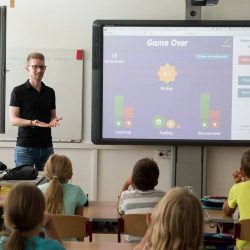Perhaps your child has recently turned three. Maybe they’re potty-trained and able to re-fasten their pants on their own. They may even be able to speak in a way that’s understandable and interact well with other kids, too.
These are all signs that your little one is ready for preschool. As you prepare to send them to preschool or pre-K, you have come up with a few questions. First of all, what exactly will they be learning?
It makes sense that you’re unsure — the preschool curriculum differs slightly from what a slightly older child would get from primary school. So, to help you and your son or daughter prepare for what’s ahead, we’ve put together a list of the basics that every preschool-age kid will learn when they start their studies.
1. Motor Skills
Your child has undoubtedly begun work on their motor skills under your tutelage. Gross motor skills are the full-body movements that they probably perform on a daily basis. If your child has ever climbed at the playground, danced to music, or run around in the backyard, then they have begun to work on their gross motor skills.
At preschool, teachers will give them the chance to continue to hone their gross motor skills, usually when the class goes outside to play. But they’ll also help them with their fine motor skills, which incorporate smaller-scale abilities, such as hand-eye coordination or the dexterity in their hands.
Fine motor skills include holding a pencil, cutting with scissors, gluing, writing their name, or drawing a picture. Your child will get lots of practice on these fine motor skills in preschool, especially the ones they need for kindergarten.
2. Vocabulary and Language
Your child has probably learned to talk already, and their vocabulary increases daily. This will become even more noticeable when they start preschool, where teachers make a point to introduce new words and concepts to kids as they embark on their academic careers.
In preschool, kids will have circle time, learn songs, listen to stories, participate in activities and centers, and play with their classmates. All of these activities will encourage them to speak often, and about new things. As such, their language, vocabulary, and speech patterns will greatly improve the more they attend school.
3. Pre-Reading Skills
On that note, one of the major benefits of pre-primary education is that your child will be even more inquisitive than before. See page for more information.
As their teachers read to them, as they come into a classroom filled with books, they will start to be more intrigued by books. And a desire to learn more or read more books will lay the foundation for the skills they’ll need to actually start doing the latter.
On top of that, their teachers will certainly start to introduce them to the alphabet and the sound that each letter makes. They’ll start to see all of what they learned come to life in group reading sessions, phonetics lessons, listening games, and even hearing instructions from their teachers.
4. Listening Skills
As a parent of a toddler, this one probably has you excited. Kids this age tend to have under-developed listening skills, and yet listening is one of the must-haves for them if they are to succeed in kindergarten and beyond.
That’s not to say that you haven’t been teaching your little one to listen. But learning to listen to teachers is a big thing that all preschoolers have to do. And preschool teachers have the tools to make these skills sink in.
A lot of the activities we mentioned previously will help your child to become a better listener. Carpet time and reading time, for instance, will require your child to sit quietly and listen to their teacher. They will also have to pay attention and listen to instructions during class activities — and because preschool activities are so fun and exciting, your child will be keen to do so.
You can bolster what they learn at school to improve their listening even more. For instance, if you make commands clearer by using a single word, your child is more likely to listen to you.
5. Social Skills
If your child has siblings, they’ve already started to learn to interact with other kids. But preschool puts them in a room with a bunch of other kids who are their age. This will help them to improve their social skills in a big way.
Your child will have plenty of time to play with their classmates, which will inspire them to talk and create together. Their teachers can intervene to help if kids have problems or disagreements, but, most of the time, they’re left to collaborate and fix their own problems. This will help your child learn how to communicate, express their feelings, and share with others.
Getting to know new kids will help your child adjust to a new school when it’s time for kindergarten. Who knows? Maybe one of their preschool friends will be in the same classroom.
6. Independence
Finally — and perhaps most importantly — preschool teaches your child how to be at least a little bit independent. This is particularly important if you have been at home with them throughout their formative years. They will learn to be confident and content in other situations and with other people.
Preschool teachers make sure to create environments that foster further independence. For instance, your child might have a classroom job, which gives them a responsibility, such as picking the storytime book or serving as line leader for the week.
Your child will also have to keep track of their personal belongings while at school and help clean up the classroom. They can choose the activities in which they participate, and they will have to be held accountable if they don’t listen to rules.
Combined, all of this will make your child a bit more independent — just in time for them to start school full-time.
There’s So Much to Learn at Preschool
These are only six of the countless things that your child will learn when they start preschool. Each one is a vital skill that will help them get through kindergarten, primary school, and beyond. So, what are you waiting for? Sign your child up for preschool and watch them bloom.
And, in the meantime, don’t forget to check back with us for the latest in education news.




